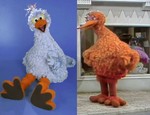Yeah, sure I knew Jim Henson's Muppets predated Sesame Street and that most were created for commercials. In the abstract. There were even a few Muppet ads screening last summer at the Smithsonian's otherwise forgettable Jim Henson Legacy exhibition.
But for some reason, I don't think they showed these Wilkins Coffee commercials from the late 50's. I think I would have remembered seeing this ur-Kermit repeatedly shoot, blowup, and decapitate his coffee-hating friend.
And I think I would have taken note of a 1966 commercial for new plush toy Muppets from Ideal, because it demonstrated a level of Muppet popularity that Sesame Street was clearly seeking to leverage, and not just because the ad featured twin Kermits reciting adorably extortionate threats:
"O buy us, O buy us,
O buy us, we beg.
For if you don't buy us,
We'll bite you in the leg."
"So buy us at once,
a bundle of charm.
And if you don't buy us,
We'll break both your arms."
By 1969 when this La Choy presentation film was made, Henson and Muppets, Inc. were comfortable poking fun at how all their commercials involved beatings and blowing shit up.
Henson had deftly exploited puppets' uncanny ability to meld life-like, 3-dimensionality with entertaining, cartoon-style violence, and he did it all in the service of selling canned chow mein and Munchos processed potato snacks.
Combine that with the Joan Ganz Cooney report which extolls the educational power of commercials and says "it is difficult to find a young television view from Harlem to Greeley, Colorado who does not cite "Batman" as his favorite television program." And you realize that Sesame Street was not only not created in a purist, non-commercial, idealist vacuum, it was designed from the beginning to channel the cartoonish, wacked out, commercial TV world Jim Henson created toward slightly better social ends.
Shockingly violent coffee commercials starring Muppets [superpunch via boingboing]
Here's a compilation of a ton of 1960's Muppet commercials and films from the 1960's [floobynooby]
Great Minds, &c. &c.Update: Just found Graham's 6/15 post about Henson's commercials on We Love You So. A different, expanding take.




I'll never understand how Jim Henson didn't own the world. The Sesame Street merchandising in the 70's alone should have gotten him billions. PBS on the other hand should have gotten a piece of the merchandising. Then they wouldn't need to have pledge drives. Henson should have been able to buy Disney at the time. Not the other way around. Methinks Joan Ganz Cooney made off like a bandit.
The answer is (1) that Sesame Street is a non-profit, (2) a completely separate company from PBS, and (3) a completely separate company from the Henson Company. It is the Henson family that has done very well...sold HensonCo (didn't include Sesame characters) to EM.TV for $680M in 2000, bought it back a couple years later for $78M, then sold non-Sesame Muppets (while keeping Fraggle Rock) to Disney for $75M in 2004.
Non-profit is not the same as non-commercial; Sesame Street is as merchandising-driven as any other kid's programmer, but I think we think of it differently because of its educational origins. What I didn't realize fully was the extent to which the Muppets were already famous--and famous for shilling in commercials--before Sesame Street ever began.
Hi Greg...I understand the difference between non-profit and non-commercial - I was merely explaining to the previous poster as to why Henson didn't get rich off of the "billions" made specifically in Sesame Street merchandising - which is due to Sesame Street's corporate structure. While you are correct in that Sesame is a large player in the licensing game (as most kid's shows are), a non-profit does not distribute its profits to owners or shareholders - in fact, it's illegal. Their "earnings", if any, must be used toward development of future programming or services for the public benefit.
I didn't know about Henson's history in the ad business either - but somehow it makes sense, considering some of the creative minds who have that background (Warhol, Rushdie, Heller, Kasdan, Terry Gilliam, Ridley Scott, Alec Guinness, etc.). Very interesting indeed.
Henson actually owned the rights to the Sesame Street characters until 2000, and shared the royalties on Sesame products with CTW. This gave him a very steady income, and allowed him to experiment on various projects without the risk of losing money, as he still had the Sesame royaties coming in.